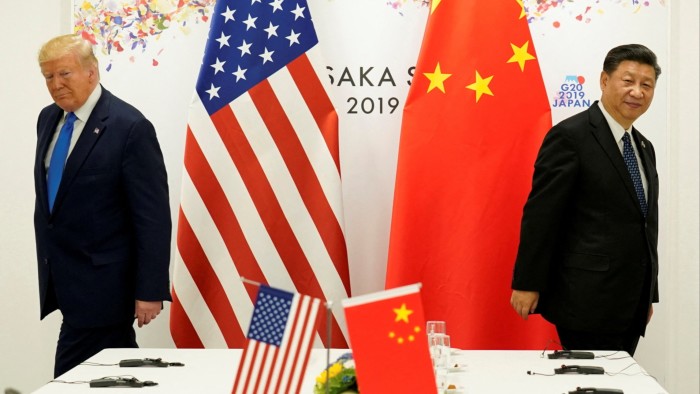Unlock the White House Watch newsletter for free
Your guide to what Trump’s second term means for Washington, business and the world
China has hit out at the US-Vietnam trade deal, amid concerns in Beijing that the US president is using his “liberation day” tariff negotiations with third countries to curb its export machine.
The deal with Vietnam lowers tariffs on Hanoi’s exports from a threatened 46 per cent to 20 per cent, but retains a 40 per cent levy on “trans-shipping” of goods — widely believed to be aimed at Chinese re-exports to the US.
The agreement, announced on Wednesday, is the second seen as targeting China since President Donald Trump outlined his “liberation day” increases in tariffs on April 2. In May, the US and UK agreed a deal that included strict security requirements for steel and pharmaceuticals that were widely seen as intended to squeeze China out of British supply chains.
China’s commerce ministry on Thursday said it was “conducting an assessment” of the US-Vietnam trade deal, adding: “We firmly oppose any party striking a deal at the expense of China’s interests.”
“If such a situation arises, China will take resolute countermeasures to safeguard its legitimate rights and interests,” the ministry added.
Scores of countries are racing to reach trade deals with the US before the July 9 deadline, when Trump’s suspended “reciprocal” tariffs will come into effect.
Vietnam, one of the world’s most trade dependent countries, had a particularly strong incentive to act quickly to avoid US tariffs. The US buys 30 per cent of its exports.
But the extent of the final tariffs agreed and the additional levy on trans-shipping reflected the heavy price for Hanoi to seal the agreement, analysts said.
“The new US-Vietnam deal is not just about trade; it is clearly aimed at China . . . it is meant to block the flow of Chinese goods that often move through Vietnam to dodge existing US duties,” said Julien Chaisse, an expert on international economic law at the City University of Hong Kong.
“This fits a much wider trend: the US is lining up bilateral deals with countries near China to tighten economic co-operation and, at the same time, [make] it harder for Beijing to stretch its supply chain influence.”
Many south-east Asian nations had prospered during the US-China trade war by offering alternative manufacturing and export hubs for Chinese companies seeking to evade US tariffs. But capitalising on this “China plus one” strategy translated into large trade surpluses in goods with the US.
“The key lesson for other countries from this deal, and that agreed previously by the UK, is that they will be expected to curtail some trade with China,” said Capital Economics’ chief Asia economist Mark Williams and senior Asia economist Gareth Leather in a note.
“That will be seen as a provocation in Beijing, particularly if similar conditions are included in any other deals agreed over coming days.”
Analysts warned that the Vietnam deal, as well as others that Beijing deems as endangering its interests, could also undermine US-China trade talks. Trump recently claimed a tariff truce with Beijing had been signed, but concerns remain over Chinese restrictions on the flow of rare-earth exports and US export controls on advanced technology such as semiconductors.
“This could certainly lead to a renewed escalation of US-China trade tensions if the US insists on very stringent restrictions by third parties on imports from China,” said Frederic Neumann, chief Asia economist at HSBC.
Adam Sitkoff, executive director of the American Chamber of Commerce in Hanoi, said it was a positive sign that Vietnam had locked in a deal ahead of the deadline, avoiding the situation of countries such as Japan, which Trump again this week threatened with higher tariffs.
Key for Hanoi will be how the 40 per cent trans-shipment levy is enforced. Trans-shipment is difficult to trace and the Trump administration has not said how it defines the practice, though it has made the issue a priority in trade talks with Vietnam and other south-east Asian countries.
Brian Wong, a professor at Hong Kong university, said Chinese officials knew the US would have trouble enforcing the trans-shipment measures, given the complexity of global trade and the ease with which companies can bend the rules.
“The devil lies in the details of enforcement as opposed to the agreements,” said Wong, adding that Beijing’s outraged rhetoric was mainly “performative”.
For Vietnam, Sitkoff noted that many details of the deal remained unclear, such as whether the 20 per cent tariff was a final amount or if it would be applied on top of existing levies, as well as which products would be subject to the 40 per cent charge.
“Assessing the pros and cons of the deal is difficult without seeing further details about what the tariffs actually mean,” he said.
“Do the 40 per cent tariffs on ‘trans-shipped’ goods apply to any product that contains content from another nation? The answers to these questions can be the difference between celebrating or crying.”
Read the full article here




